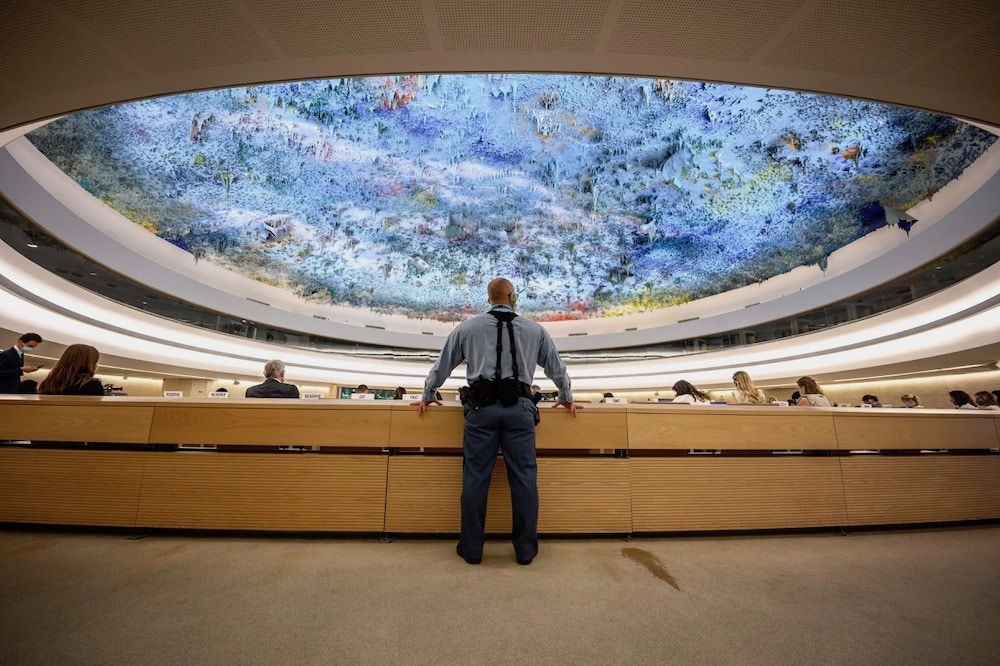"The UN now has the chance to build on the good practices adopted by the Human Rights Council, Treaty Bodies and related mechanisms in Geneva and consolidate the modalities of participation that allow for a broader, more inclusive, effective and climate-friendly human rights system."
Geneva, 07 June 2023
His Excellency, Mr António Guterres, Secretary-General of the United Nations
His Excellency, Mr Csaba K.rösi, President of the 77th Session of the UN General Assembly
His Excellency, Mr Václav Bálek, President of the 17th cycle of the Human Rights Council
Ref: Civil society participation at the UN Human Rights mechanisms in Geneva
Excellencies,
The undersigned civil society organisations are writing to express our views on the issues of participation at the UN Human Rights Council, Treaty Bodies and related mechanisms in Geneva. We welcome the recent UN Secretary General’s agreement to maintain the current modalities for the 53rd session of the Human Rights Council as well as to maintain hybrid modalities for the 54th session, and we stand ready to support the Office of the High Commissioner for Human Rights in ensuring these modalities become permanent.
For the past three years, the business continuity scheme has provided an opportunity for the Human Rights Council, its mechanisms, and the UN Treaty Bodies to strengthen their efforts and ensure the possibility of participation via live online interventions and pre-recorded videos, coupled with in-person participation, throughout the sessions of Geneva-based human rights mechanisms, as well as formal and informal meetings and side events.
Establishing effective means for remote participation has been a longstanding demand of civil society organisations. We recall that, prior to COVID-19, there were already significant barriers to entering multilateral spaces faced by civil society organisations and human rights defenders, particularly those working at the national level or with long travel distances to UNHQ locations. These barriers include denial of visas, ECOSOC status requirements, unsustainable costs or length of travel, lack of translation and interpretation issues, accessibility for people with disabilities, technology access and safety issues.
The High Commissioner’s report A/HRC/51/13 stressed that the move to online and digital platforms “helped to expand outreach and engagement to previously excluded or underrepresented communities”. It added that “several United Nations human rights treaty bodies have held virtual meetings and briefings with civil society and victims at the local and grass-roots levels”. In some circumstances, remote means of participation also reduce the risk of reprisal that may be associated with in-person engagement.
The report also concluded that “the recipe for effective crisis response and for trust and resilience is a more systematic investment in meaningful, safe and inclusive participation at all levels, coupled with effective measures to protect access to information and an enabling environment for debate as well as the security and holistic protection of those who speak up”.
In 2022, a survey released by HRCNet on the future of civil society participation at the Human Rights Council showed that the modalities adopted by the Council in the previous years made it more accessible and overall better for the people on the ground by allowing for the benefits of remote participation to be coupled with the advantages of in-person interaction during sessions.
Questionnaires conducted by diplomatic missions in Geneva during the same period also revealed a strong preference for in-person meetings with the possibility of live online interventions, particularly in Least Developed Countries (LDCs) and Small Island Developing States (SIDS). These options also help States participate in Universal Periodic Review (UPR) sessions in more significant numbers, providing avenues for dialogue and accountability. States have also highlighted the importance of virtual modalities of participation for people with disabilities. Video statements, automated captioning technology and other features through Zoom have become a norm, ensuring greater accessibility to the Council.
Geneva is the central hub for human rights conferences at the UN level, and actions should be taken to mitigate its contributions to the climate crisis. While in-person meetings are necessary, the possibility of intervention through online participation allows the UN to align its practices with the urgency of reducing carbon emissions and to lead by example, which can only result in greater engagement and ownership of norms and standards. Both the General Assembly and the Human Rights Council have recently adopted landmark decisions recognising our right to a healthy environment [1]. The UN can and should lead the way in providing options for all stakeholders, States, UN agencies and civil society to participate.
An inclusive approach to participation requires that the United Nations addresses the limited space for civil society engagement. The UN now has the chance to build on the good practices adopted by the Human Rights Council, Treaty Bodies and related mechanisms in Geneva and consolidate the modalities of participation that allow for a broader, more inclusive, effective and climate-friendly human rights system.
The undersigned organisations respectfully request you to:
Develop and publicise a plan to enable civil society remote participation in all UN human rights mechanisms after the 54th session of the Human Rights Council.
That the General Assembly and Conference Management ensure that UNOG, the Treaty Bodies, the Human Rights Council and related human rights mechanisms in Geneva are enabled permanently to provide the possibility of video statements and online interventions through Zoom, WebEx or other tools in all in-person meetings, following the practices consolidated during the business continuity scheme.
Consistently consult with civil society organisations in a timely and inclusive manner about any measures that will affect participation and ensure that decisions being made in New York are communicated and discussed with those affected in Geneva. Please accept, Excellencies, the assurances of our highest consideration.
[1] Resolution A/HRC/RES/48/13 and Resolution A/76/L.7



